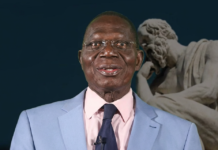By Abraham Ogbodo
Prof. Mahmood Yakubu suddenly ran out of oxygen. He was appointed Chairman of the Independent National Electoral Commission (INEC) by former President Muhammadu Buhari on October 21, 2015. He was sworn into office on November 9, 2015, for a five-year tenure that was renewable for one more term upon completion. He would have statutorily run his course by November 8 2025. He, however, brought forward his disengagement by about a month when he announced his resignation last Tuesday and handed over to Mrs May Agbamuche-Mbu, the most senior commissioner, as acting chairman of the electoral body.
In 10 years, Prof Yakubu ran two general elections in 2019 and 2023. In between and after 2023, he conducted 19 end-of-tenure as well as off-season governorship elections in eight states. These are Ekiti, Osun, Edo, Ondo, Anambra, Imo, Bayelsa, and Kogi States. He also recorded about 300 supplementary elections into the legislative houses at both the state and federal levels. The governorship election in Anambra State is due on November 8, 2025, and Prof Yakubu was expected to add that to his quiver before his exit the following day.
That was not to be. The man who feared no elections and had, in a few instances, decreed electoral outcomes against proofs and perceptions, hesitated for the first time. He was an unwillingly warrior this time around. He had had enough and quietly asked President Bola Ahmed Tinubu to be allowed to go home in peace. It was the wise thing to do. Elections in Nigeria start at the polling booths but do not end there. The electoral system has extensively evolved in two and half decades to a point where the obvious is vigorously interrogated. Elections continue beyond the polling booths unto courtrooms where judges play greater roles in the determination of winners and losers than the field umpires themselves.
Yakubu didn’t want to start what he would not stay behind to finish. Others might finish it poorly for him. He did not want to be blamed unnecessarily. He had enough blame for the 2023 general elections and other elections in Edo and Ondo States. And until his exit from the commission last Tuesday, Mahmood Yakubu was still searching for enough English words to explain convincingly what happened in the presidential election in 2023. That is, to explain what he described as ‘’technical glitches’’ that prevented the effective application of the much advertised Bimodal Voter Accreditation System (BVAS) and the uploading of the presidential election results in real time on the INEC Results Viewing (IREV) portal.
This outcome fell grossly short of the bargain struck before the election. The Bauchi-born Professor of Political Science had promised to do heaven and earth to create a watershed with the 2023 general elections. He promised to mobilise men and machines to achieve a novelty. It was an alluring package. Only N305 billion was needed for the wonder. The National Assembly, without propping, upped the estimates by N50 billion to N355 billion to contain all exigencies and guide against anything going wrong with the delivery. The budget was not even scrutinised or debated. The legislators just approved everything in the spirit of the moment. Funding was, therefore, not a constraint. The focus was to ensure the happiness of Prof Yakubu and his commission for the great job ahead. Everything looked good.
But the devil was in the details. Prof Yakubu was not looking for answers to the perennial questions. He already had answers and was only looking for the right questions to match his answers. He adopted an almighty formula called ‘’technical glitches’’ that provided the questions to the written answers. Even the courts subsequently agreed that BVAS and IREV, in spite of INEC’s own guidelines, are not part of the substantive law that should govern elections in Nigeria. I sincerely do not know where we are right now with these pieces of technology – BVAS and IREV – regarding a transparent electoral process in Nigeria. If that piece of judicial interpretation has become part of our electoral jurisprudence, someone may need to take it upon himself or herself to return to the courts or the legislature to straighten things out before it gets too late.
The butcher does his business in spite of the swarming flies. The arising noise did not affect Prof Mahmood Yakubu as such. He had continued with his work till the end as if nothing was amiss. He has gone down history as the first central referee in the electoral system that ran full course. The reviews have started and shall continue until the end of time. Now that the erudite Prof has climbed down from the high stage, he will be more detached to view a replay of his performance. He might be able to tell now that 2023 was not a super performance after all. He would understand now that the explanation of technical glitches as a basis for that shameful abdication only insulted his intellect and spirit.
As we know, there is no forgiveness in the grave. It means repentance is only meaningful when it happens at the right time. Regarding Mahmood Yakubu, even if book makers attempt to approximate history to suit a purpose, posterity shall remain faithful to the issues. The man has become part of our electoral history, and he will be judged by the same history. Before him, some 12 persons had held sway as heads of commissions created to conduct elections into different political offices in the country. It had started effectively in 1959 when Ronald Wraith superintended over the elections that marked the beginning of self-rule on October 1, 1960. Between 1959 and 2015, when Mahmood Yakubu came on board, there were Eyo Esua, Michael Ani, Justice Ovie Whiskey, Prof. Eme Awa, Prof. Humphrey Nwosu and Okon Uya. Others were Dagogo Jack, Ephraim Akpata, Dr. Abel Guobadia, Prof. Maurice Iwu and Prof Attahiru Jega.
Not everyone on that list stood or stands tall, and we know why. Living or dead, each of them maintains a place in the national consciousness. Prof Yakubu has just earned his place, too. Good enough, he is alive to hear the verdict on where he stands in the ranking. I am just a commentator. I do not equate the grand jury on this very crucial matter. Nobody markets or de-markets the truth. It is unaffected by created and recreated narratives. Going forward, Mahmood Yakubu shall have a fair judgment in the end. What he says or does now shall be of little or no consequence. He would be justified or vilified; commended or condemned by his settled deeds, and not what comes after his exit from office.
There is also a noticeable trend with the list above. Until the advent of Prof. Humphrey Nwosu of the Option A4 fame, and who I can confidently say maintains a high position in the ranking, names of electoral umpires had followed a pattern that underscored efforts at ethno-religious balancing of the polity. There was a preponderance of names from the minority groups. To inspire confidence in the electoral system, the unwritten rule then was to source umpires among the minority groups in the deep South. The rule might stand vitiated if a minority ascended leadership. That was why President Goodluck Jonathan felt cool, appointing and running with Attahiru Jega as INEC chairman. I can add for free that the man may act differently if presented with the same scenario today. He wasn’t too wise then. His knowledge about how things are run in Nigeria has significantly increased since he left office about a decade ago.
Meanwhile, as ambition replaces vision in the pseudo drive to build a nation, politics has become a shooting war where all is fair. President Mohammadu Buhari did not entertain any qualms running with Prof. Mahmood Yakubu, a Fulani and Moslem from the North. President Bola Ahmed Tinubu has entered to deepen the infraction. He announced yesterday the appointment of Prof. Joash Amupitan as replacement for Yakubu. The 58-year old Professor is a Yoruba from Kogi. He teaches at the University of Jos. When it turns out this way, the copious ethnic bias is cloaked in a seemingly admissible argument. The political map puts Kogi and Kwara in Northern Nigeria. And so, Tinubu, a Yoruba from the Southwest, is, in fact, strengthened by that artificial delineation to appoint his northern kinsmen from Kogi and Kwara States in pursuit of the Federal Character principle and geo-ethnic balancing. Just as his Attorney General, Chief Lateef Fagbemi (SAN), is a Northerner from Kwara State and not necessarily a Yoruba man.
I must, however, add that the audience cares less about the medium if the message turns out perfect. We shall, therefore, wait for Prof. Amupitan to fully unravel to either prove his strength or weakness. Like Sophocles’ Antigone, he may choose to be awkwardly caught between a duty to the state and a duty to a kinsman. His fate is in his head and hands. For now, President Tinubu’s ambition is everything. It is far ahead of his vision in his scripted mission to build a greater Nigeria. It is only time that will tell if the appointment of the acclaimed jurist, Prof. Joash Amupitan, as INEC Chairman, is part of that script.






















